After half a decade of blogging experience, I’ve learned that when it comes to promoting your blog, there are only three ways.
No matter how many listicles you browse, every tactic you see falls into one of these three categories.
Imagine being able to share your content with hundreds or thousands of people with one click. That’s the power of building an audience.
Building an audience means getting people to follow you so you can reach them at any time. For example, Gaetano is subscribed to our newsletter. We can reach him whenever we want by sending an email.
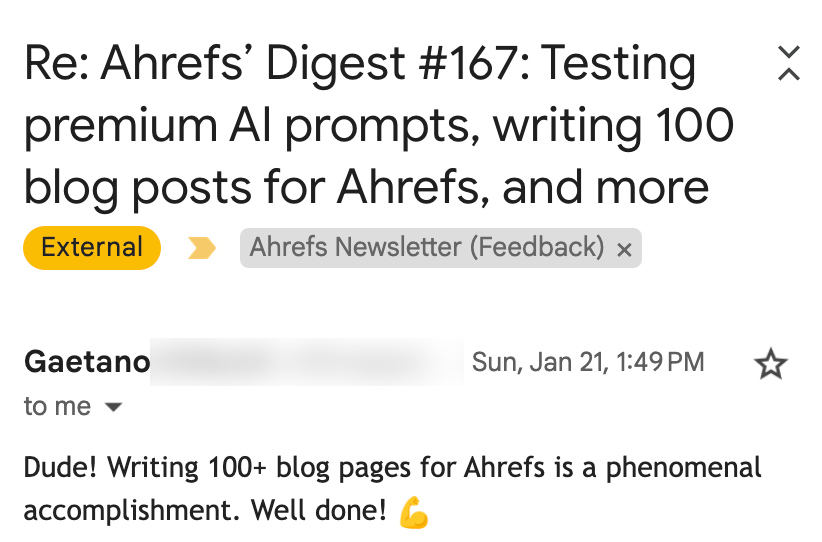
How can you build an audience from scratch? Here are some tactics you can use:
Get email subscribers with lead magnets
If there was one audience-building channel I suggest you invest in, it would be your email list.
The reason: Your email list will always belong to you. You can contact your audience anytime as long as they allow you to.
To build an email list, you need to give your blog visitors a reason to subscribe. Most blogs use lead magnets—a free resource in exchange for the visitor’s email address. For example, personal finance blogger Nick Maggiulli gives away the first chapter of his book:

You don’t have to be an author to entice people to sign up. Anything can be a lead magnet as long as it’s valuable to your audience. You can even have more than one type of lead magnet. It could be an eBook, course, template, checklist, report, or anything else you can dream up. Check out our post on more lead magnet ideas you can use.
Once you have your lead magnet, you’ll want to promote it as much as possible (but not so much that it ruins your blog’s reading experience). For example, we have a simple “sign up for our newsletter” call-to-action (CTA). We’ve added this CTA at the top of our blog posts and as a sticky opt-in box at the side.
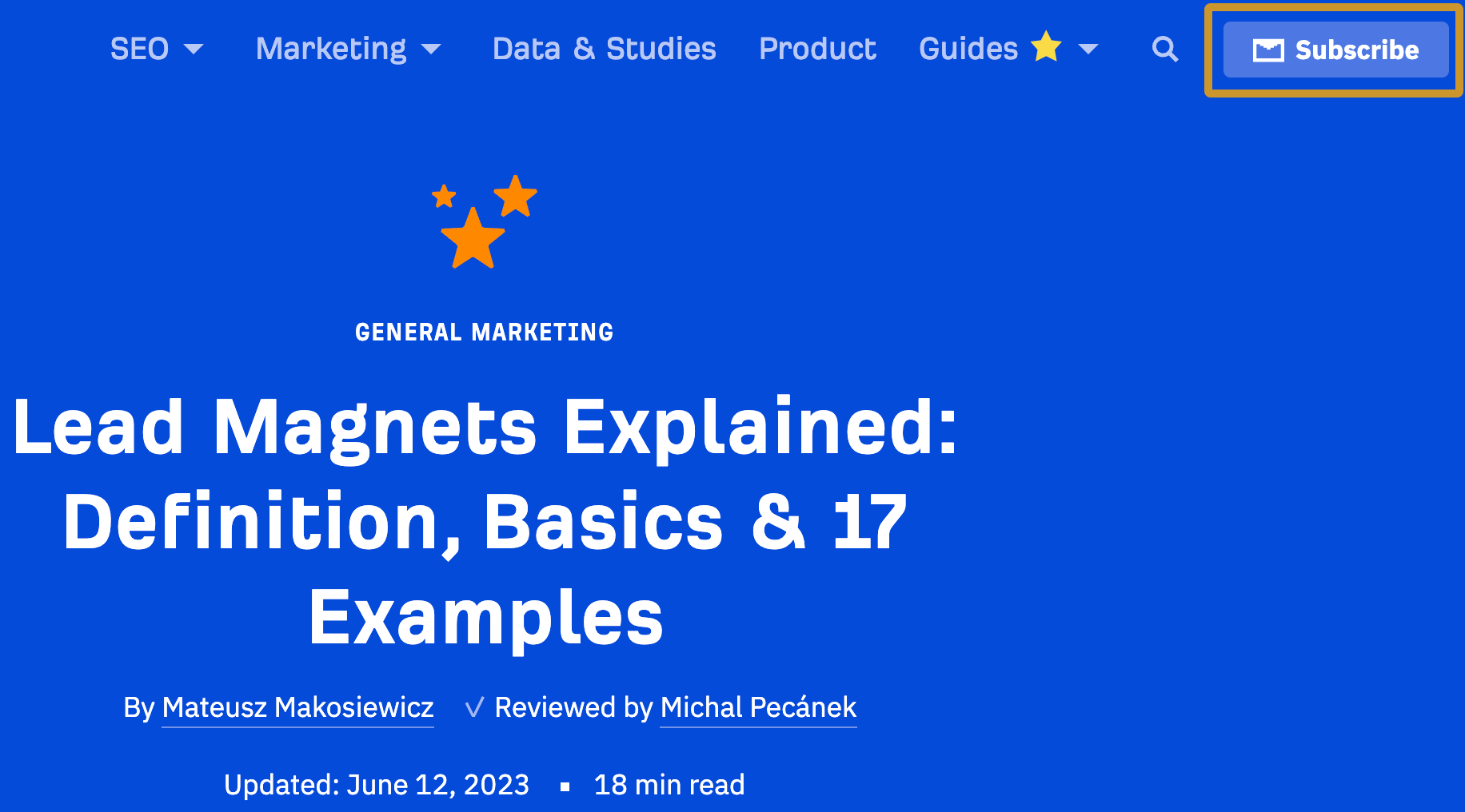
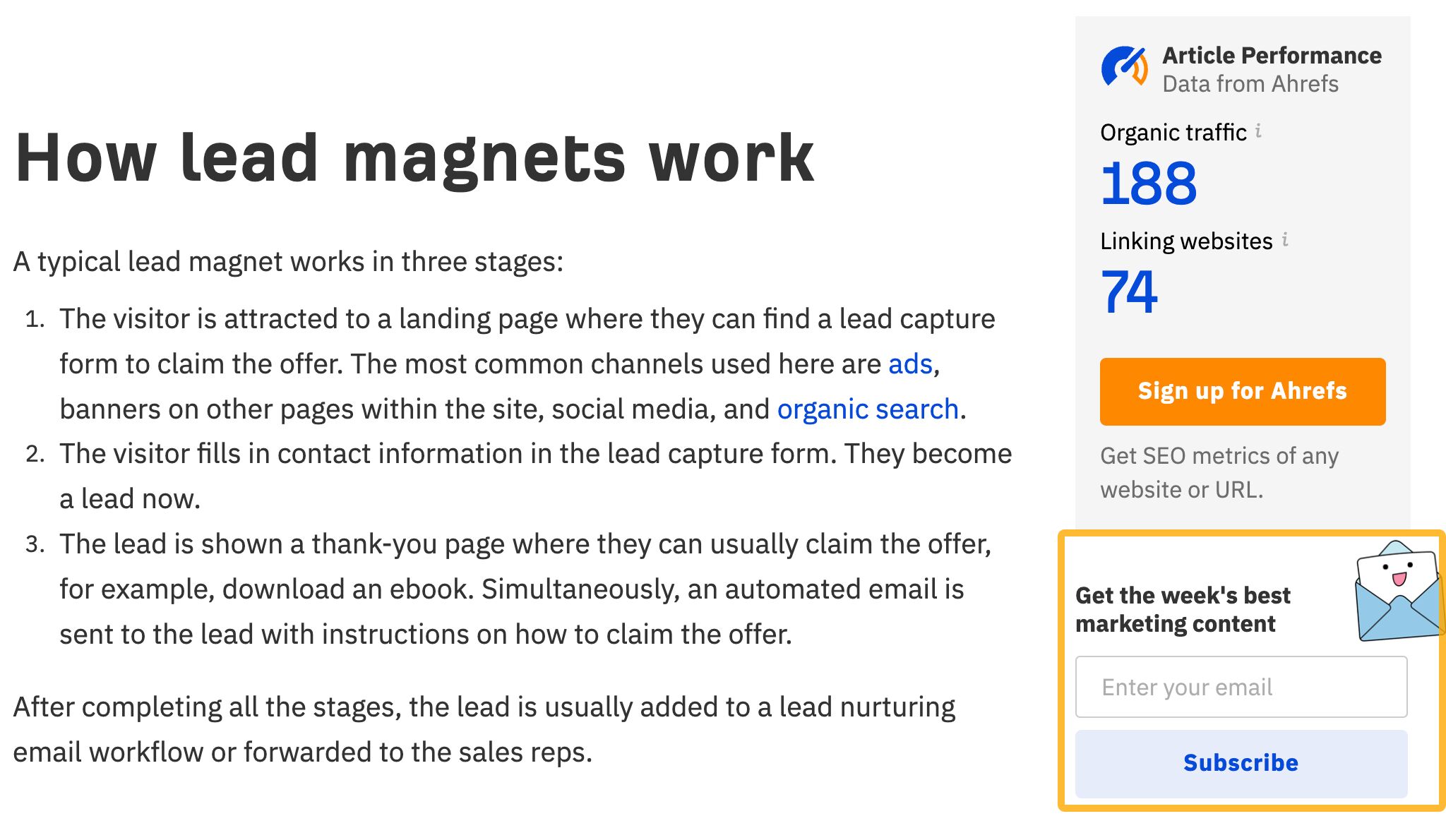
Once you start building your email list, keep in touch with them frequently. You can send an email whenever you publish something new (as we used to do) or collate them into a cadence you’re comfortable with. For example, we send a newsletter every week.
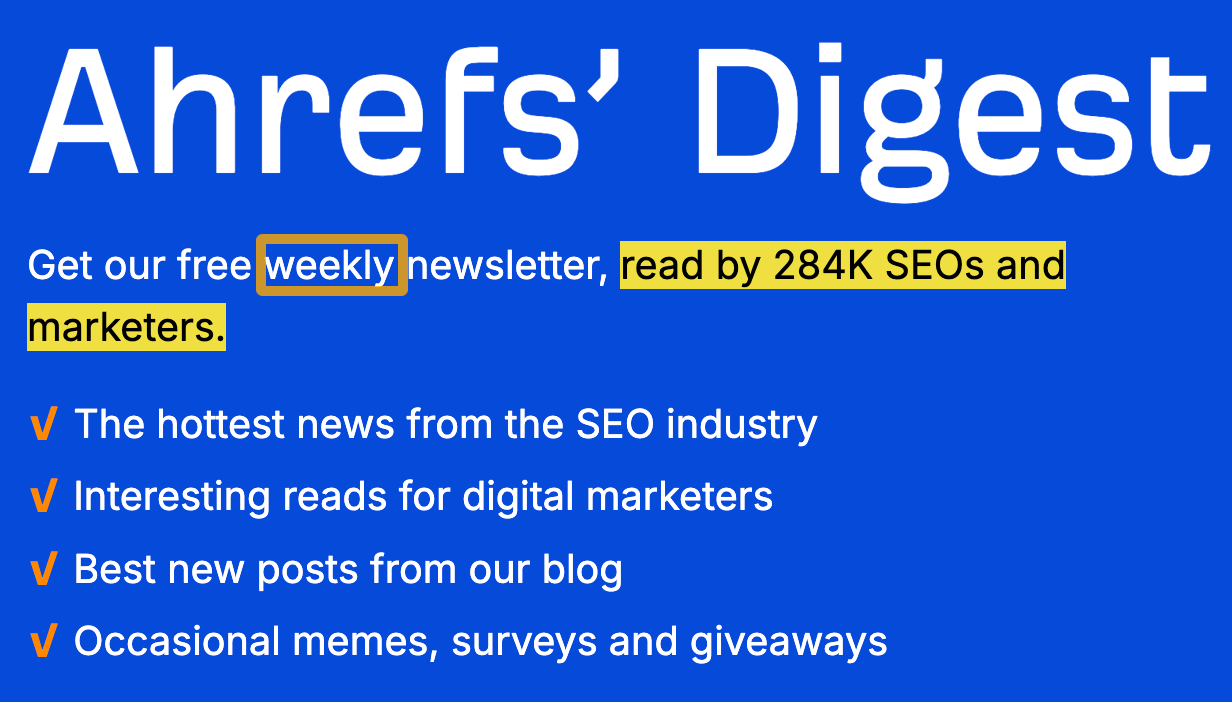
Start a private community on Facebook
Anyone can start a group on Facebook. It’s free and easy to set up, and anyone with a Facebook account can join your group immediately. You can also leverage the Facebook algorithm to promote your group.
For example, SEO Signals Lab is one of the most popular SEO Facebook groups, with more than 75,000 members.
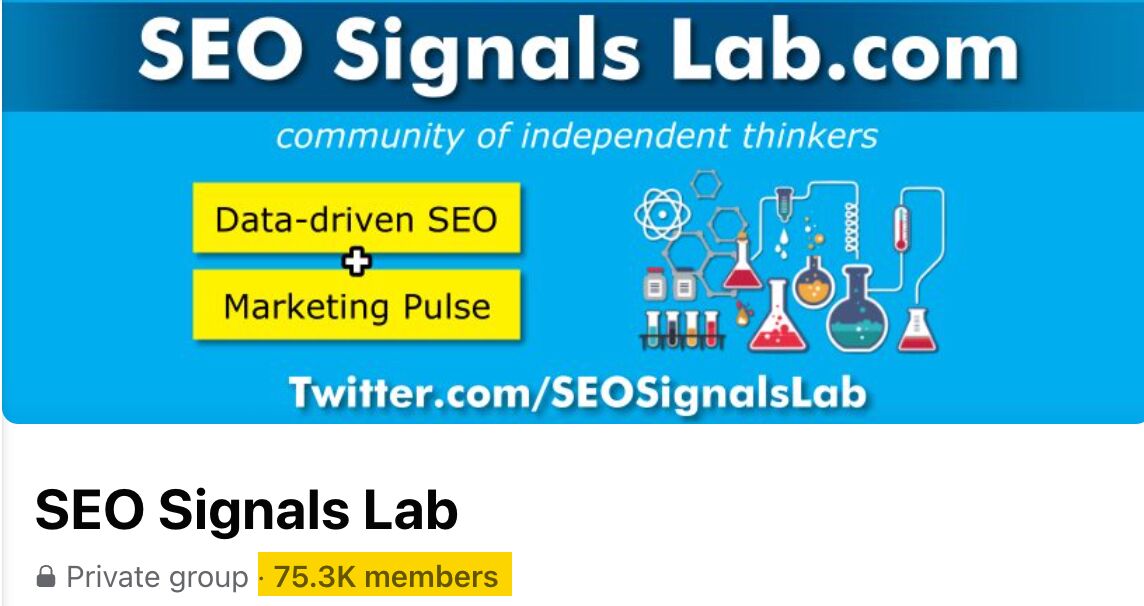
You can then promote your blog by posting a link to your new posts or posting ideas from your post natively, like what this person did:
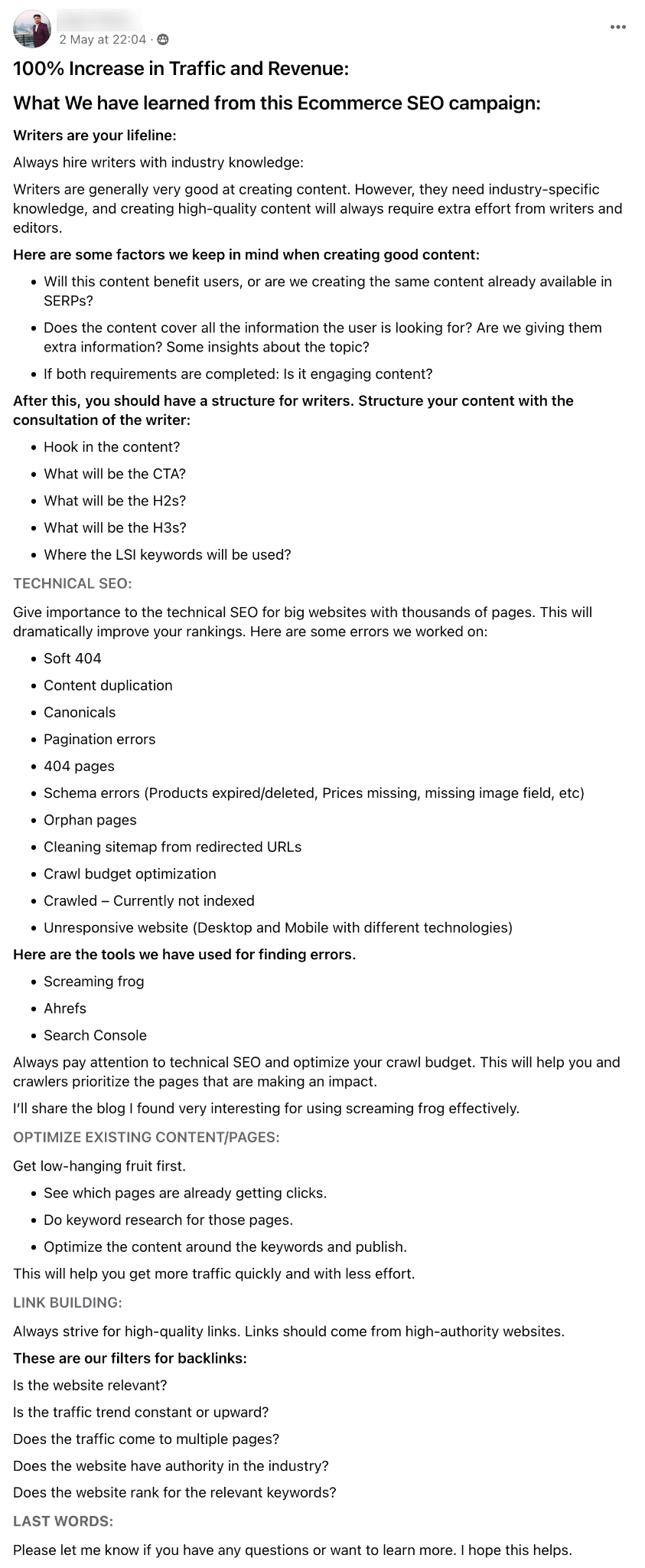
When it comes to communities, more is not necessarily better. Facebook groups suffer badly from the tragedy of the commons—unfettered access tends to destroy them due to spam, grifting, and all sorts of poor Internet behavior.
So, I highly recommend making your group private and gatekeeping potential members. For example, one of the reasons why Ahrefs Insider, our private Facebook group, is high-quality is because we only allow our customers to join. We ensure this by making everyone submit the email address tagged to their Ahrefs account.
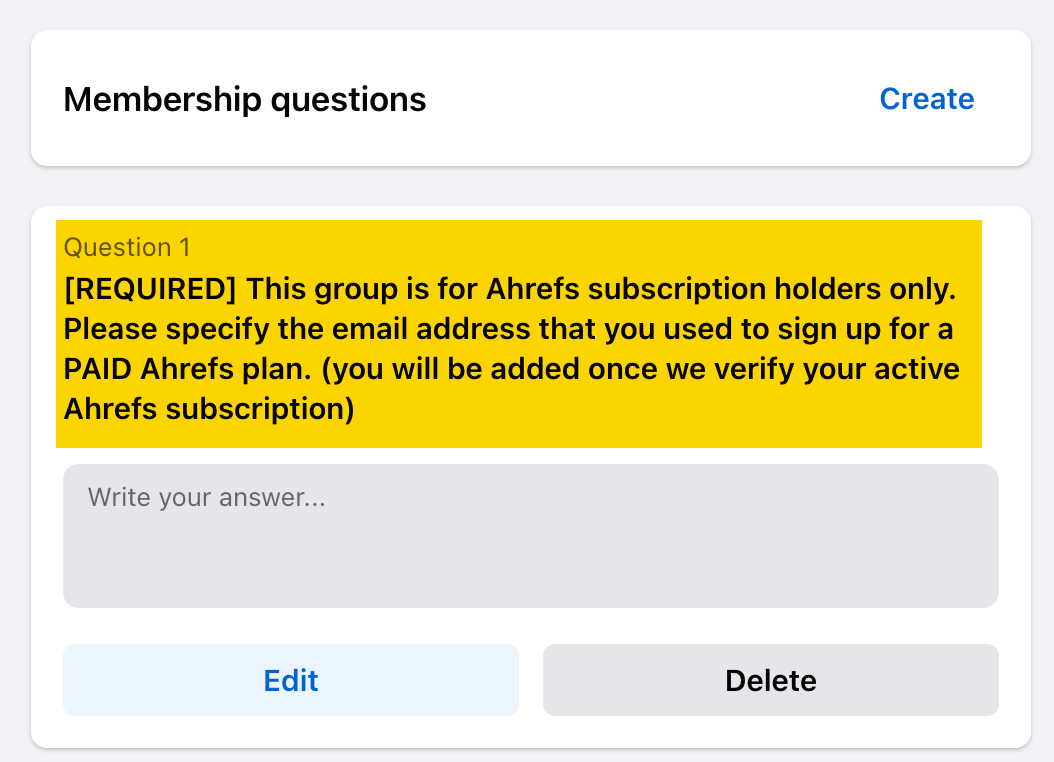
That said, you’ll still need to invest in moderation. Just because someone has skin in the game doesn’t mean they won’t grift. You’ll need to step in regularly to delete unsavory posts, remove abominable comments, and ban spammers.
Build a following on X (formerly Twitter) or LinkedIn
I recommend X and LinkedIn because these are the likely places that will drive traffic to your blog. (I mean, people on YouTube and TikTok want to watch videos, right?)
Here’s the thing, though: Unlike the good old days, you can’t just post links to your blog and expect clicks. Social media platforms want to keep you on their grounds, so they’ve taken to throttling the reach of posts with links.
Look at this tweet of mine. It only got 189 views and a pathetic 8 clicks:
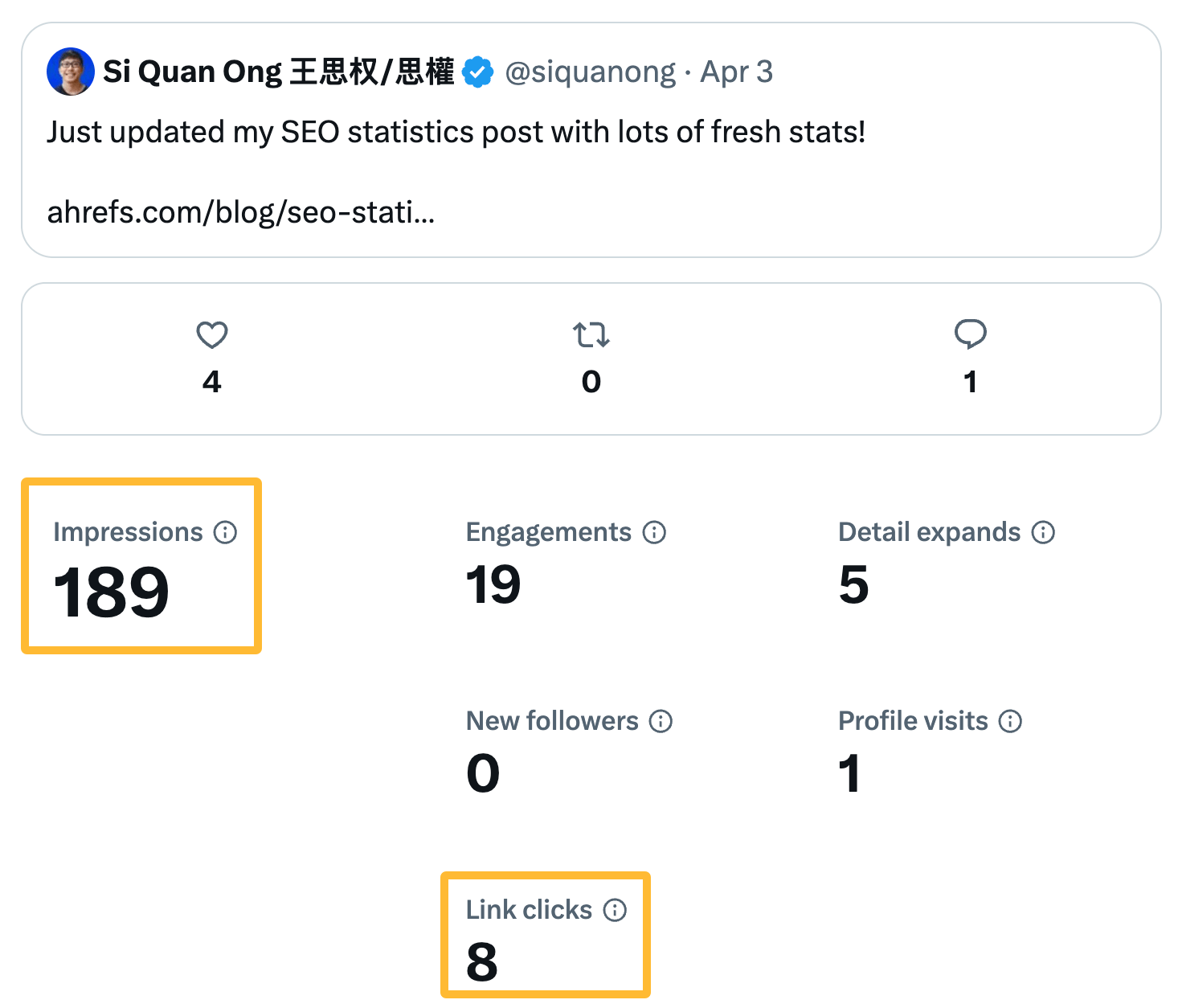
If you want to build a following on X or LinkedIn, I recommend creating zero-click content. This is content that offers valuable, standalone insights without the need to click. You don’t have to do this from scratch either—just repurpose the tips, insights, and tactics you have from your existing content.
For example, I re-posted each lesson from this post as individual ones on X and LinkedIn:
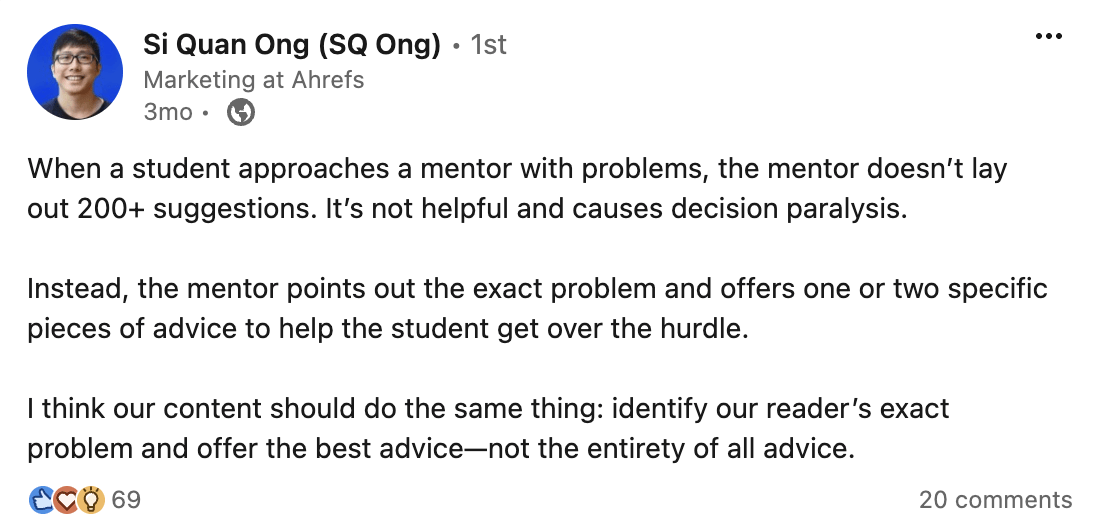
From there, you can add a link back to your blog post at the end of the thread or in the comments. You can even drive them to your email list, like what Justin Welsh does:
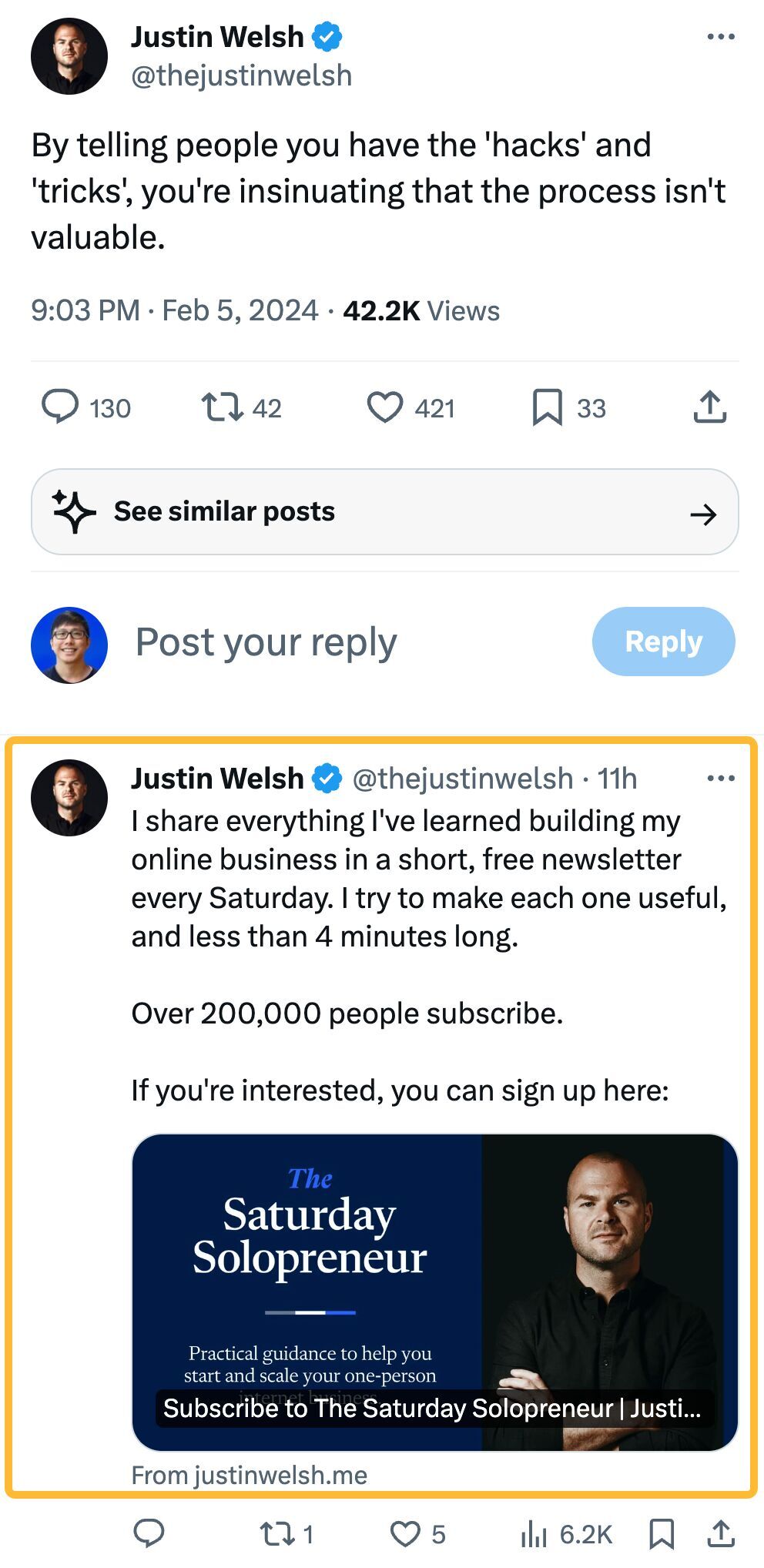
You know the meme about how you need experience to get a job but you also need a job to get experience?

Blogging is similar—You need visitors to build an audience, but you need an audience to get visitors. Unlike the job conundrum, you can fix this by ‘borrowing’ audiences.
Borrowing an audience means finding places where your target audience already hangs out online and getting your content in front of them.
Here are some tactics you can use to do this:
Optimize your content to rank in Google
Google is the best place to borrow an audience. Search traffic is predictable, compounding, cheap, and targeted.
To get traffic from Google, you can’t write about random topics. You need to write about topics people are searching for.
Here’s how to find topics people are searching on Google:
- Go to Ahrefs’ Keywords Explorer
- Enter a topic relevant to your blog (e.g., if you own a blog about the ketogenic diet, enter ‘keto’)
- Go to the Matching terms report
- Switch the tab to Questions
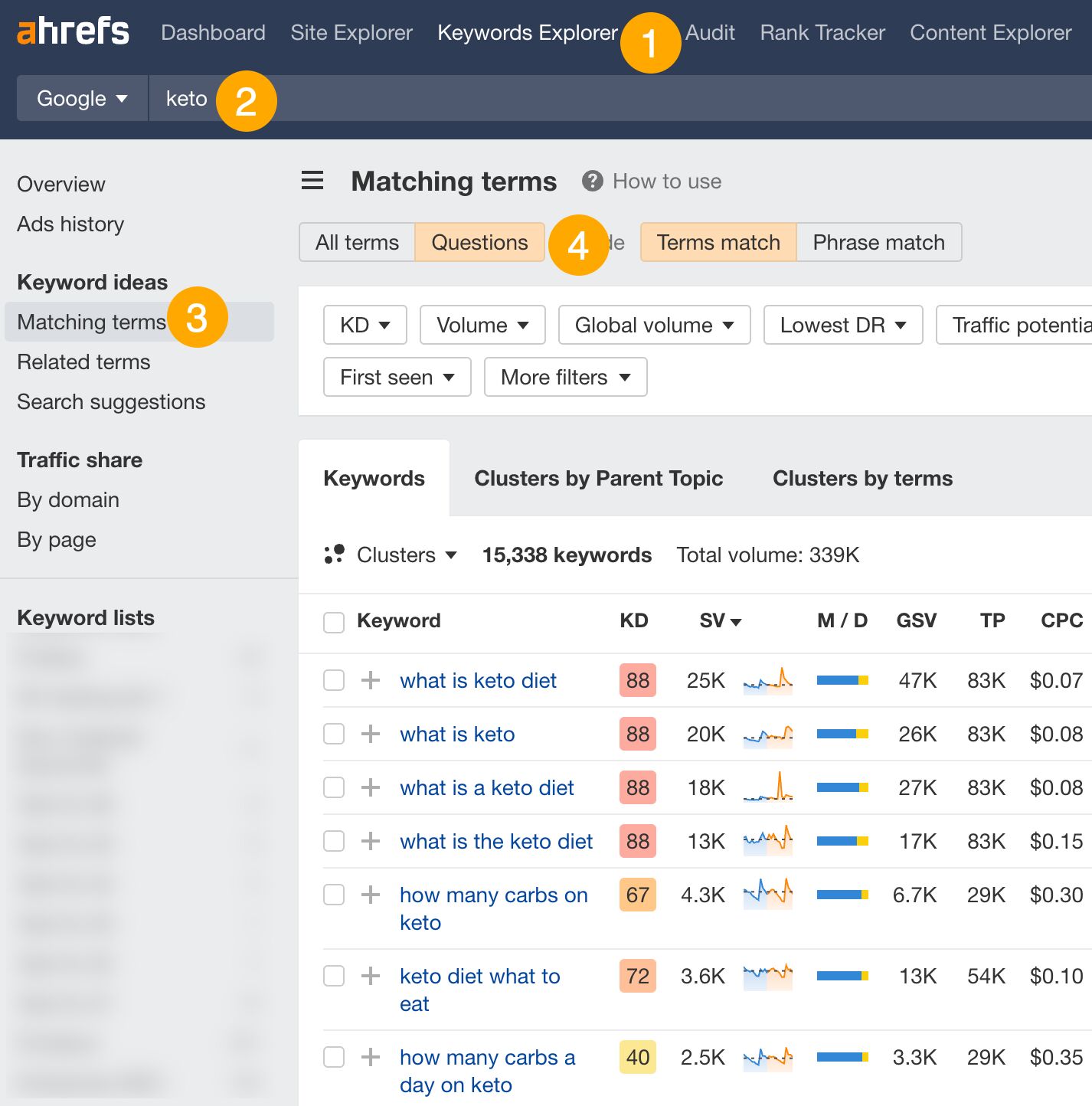
Look through the list and see if there are any potential keywords you could target.
Once you’ve selected the topics, you’ll want to figure out why the searcher is looking for the particular keyword. Knowing this ‘why’, aka search intent, can help you create content that the searcher wants to see.
You can figure out search intent by looking at what’s already ranking on Google. The easiest way is to enter your target keyword into Keywords Explorer, scroll down to the SERP Overview, and click Identify intents. For example, if we do this for the topic “what to eat on keto diet”, we can see that searchers want a list of allowed foods on the diet.
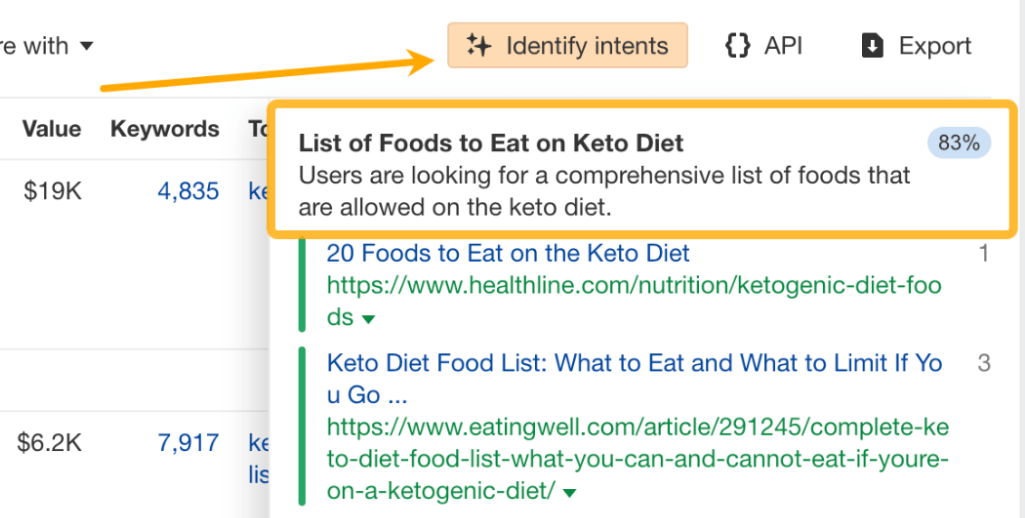
So, when writing our article, we’ll want to align our blog post to answer the questions searchers have about this topic.
Offer to update other people’s posts
If you can find posts on other websites that are declining in search traffic, it might only take an update to reclaim rankings and traffic. By offering to do these updates for them—and subtly linking to your content within the updated post—you can promote your blog to potentially thousands of people every month.
Here’s how you can find content that’s declining in organic traffic:
- Go to Ahrefs’ Content Explorer
- Search for your topic
- Set a minimum Page traffic filter (>500) so you can only target pages worth your while
- Toggle Filter explicit results
- Set a Language filter to your target language
- Check Exclude homepages and subdomains
- Set the Trends dropdown to Last year
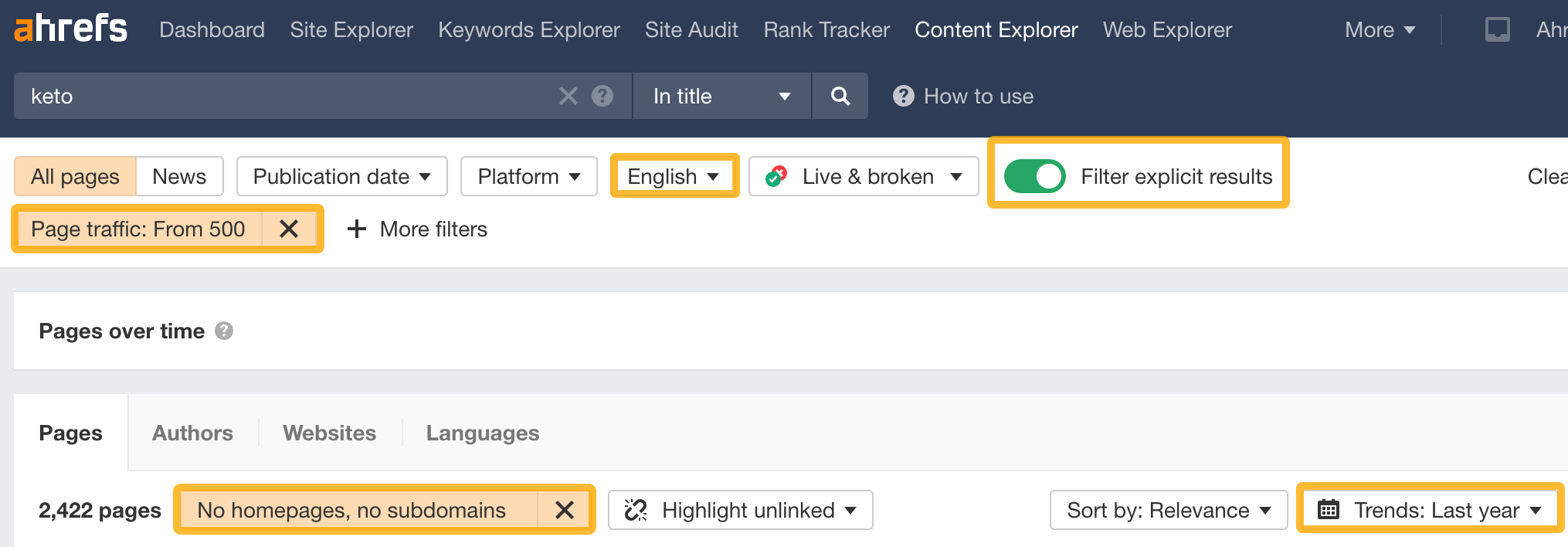
Go through the list and look out for pages with declining page traffic.
For example, this article from PureWow looks like a good candidate:

Reach out to the editor and see if they’d be interested in updating the post. Sweeten the deal by offering to do the work for them and optimizing it to rank higher on Google, like what Irina Maltseva, the former head of marketing at Hunter did:
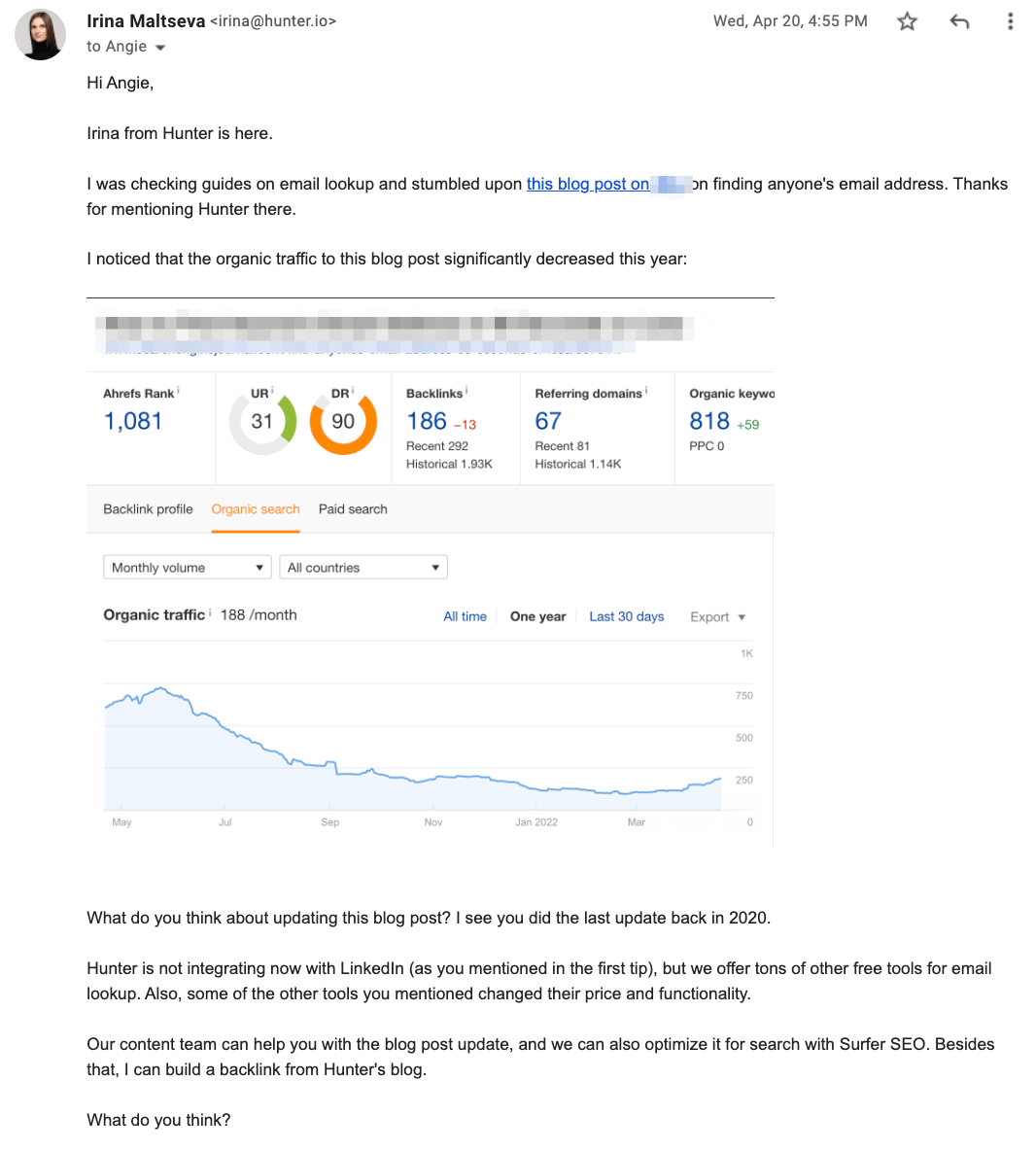
Share barebones posts on Reddit
There is a subreddit for almost anything. If you do it right, you can borrow Reddit’s massive audience and drive lots of visitors to your blog.
But you can’t just waltz in, drop a link, and expect to get a flood of traffic. Redditors hate advertising and marketing more than anything. If they catch a whiff of self-promotion, they will not hesitate to throw you out and ban you.
However, Reddit does **** useful content. So, to bypass the hate brigade Redditors may deliver your way, share a barebones version of your content. Strip everything out, especially your internal and external links. Leave only a link back to your original post at the bottom, so anyone who’s interested can check it out.
For example, here’s what our Chief Marketing Officer (CMO) Tim Soulo did on r/bigSEO:
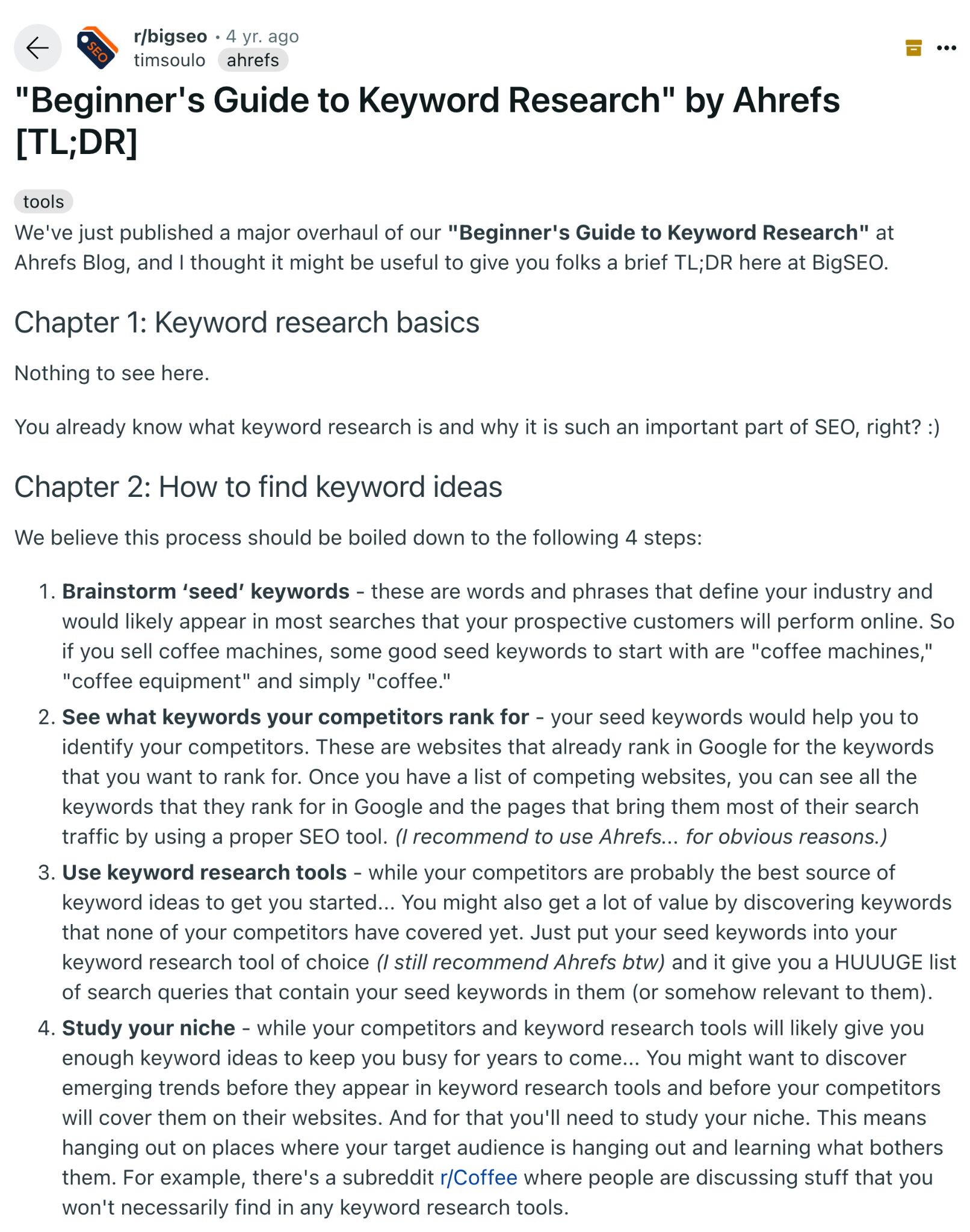
Four years later, this post is still one of the top posts of all time in the subreddit.
Build relationships with amplifiers
Influencers, podcasters, YouTubers, journalists, and newsletter writers will have significant audiences you can borrow.
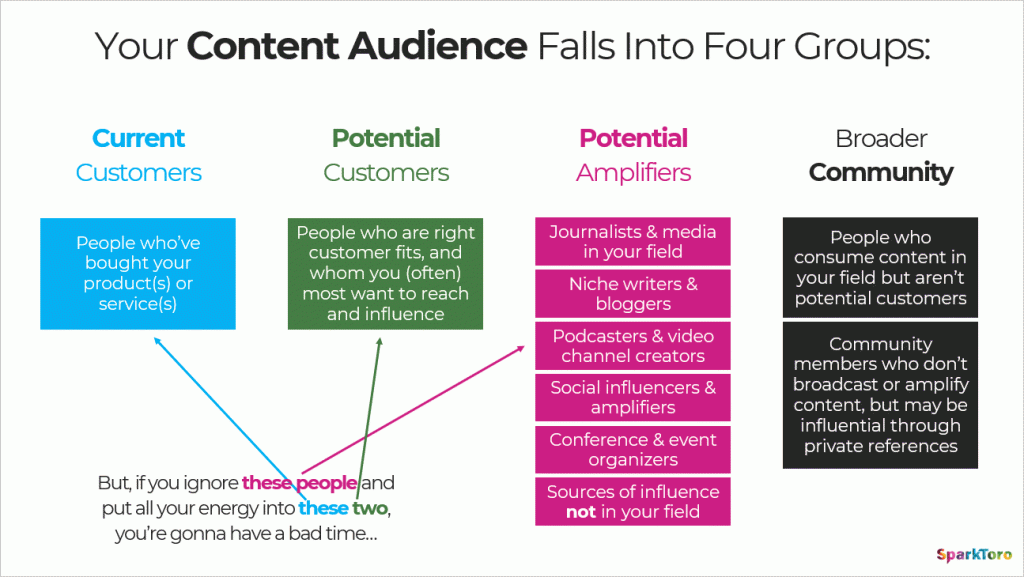
But these people have an audience for one reason: They consistently share interesting and quality content—not just anything from anyone and everyone.
So, to ‘borrow’ their audience, you need to cultivate good relationships with these people. You need to practice what my friend Visakan calls ‘good reply game’.
You want to support their work: by consuming, sharing, and complimenting. But you don’t want to fawn over them (everyone does this) or sound like an AI.
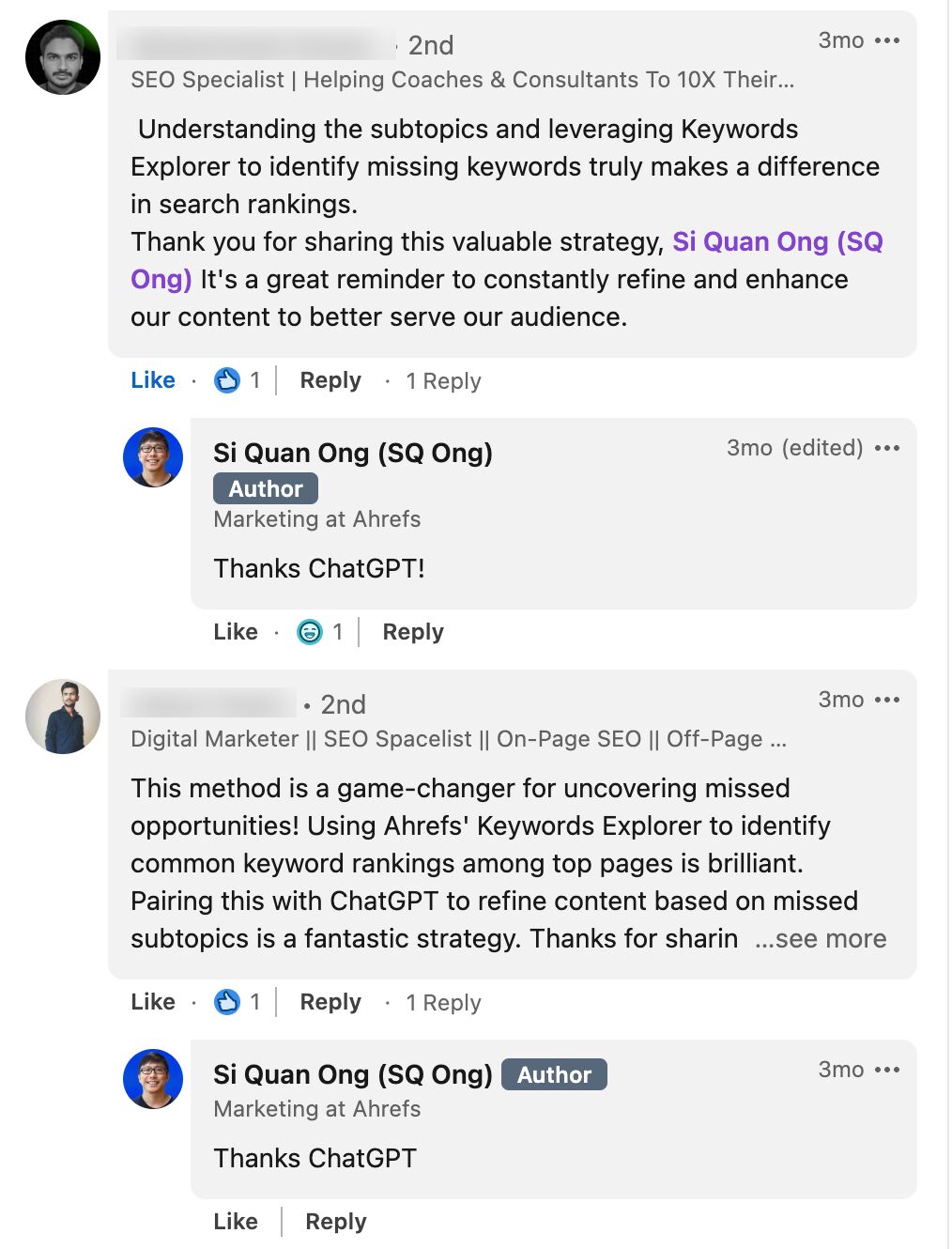
In fact, if you disagree and share your opinion intelligently but not belligerently, you will catch their attention.
Building a friendship with amplifiers doesn’t mean expecting them to share every article you publish. That’s transactional and people can smell it from far away. It’s a surefire way to lose friends.
You’ll want to share only your best work with them. Do that with no expectations. If your work is good, you’ll find that they’ll naturally share it with their audience, just like Rand Fishkin did unprompted when we published our article on podcast advertising.
If you have enough money to solve a problem, then the problem doesn’t exist.
So, reaching an audience is not a issue if you have the budget. You can pay for eyeballs via Google Ads, social media ads (e.g., Facebook, X, Instagram, TikTok), or newsletter ads.
If you’re new to blogging, you may think this is out of your reach and you don’t have any budget for paid advertising. But don’t forget: No tactic is truly free. Even if you’re not using money to execute, you’re using time. And time is money.
Think about it: If you could spend $100 on an ad and drive a guaranteed 1,000 clicks, would you do it? Compare that to spending 10 hours repurposing your content for LinkedIn and leaving your fate to the algorithms. Sometimes, it makes more sense to run the ad and use your valuable time to do other things for your blog.
Final thoughts
In blogging, all roads lead to Rome. And the “Rome” in the blogging world is owning your audience.
When you own your audience, you can reach them anytime. You’re no longer reliant on the whims and fancies of other people or algorithms.
So, even if you’re borrowing or paying for an audience, make sure to funnel those efforts into building your own audience.
Got questions? Ping me on LinkedIn.
Source link : Ahrefs.com
